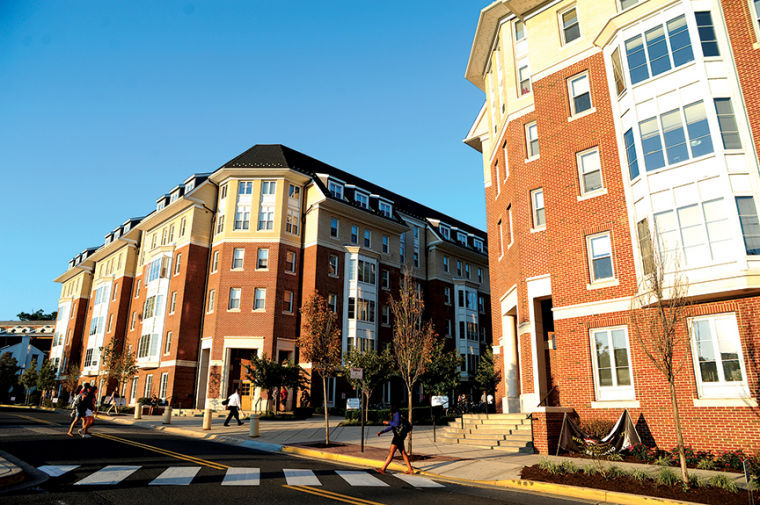
South Campus Commons 5 and 6
As the spring semester comes to a close, Kayla Kahn, a senior physiology and neurobiology major, is facing a dilemma: What should she do with her apartment in Parkside at College Park?
“Come June 2, I’m going to Teach for America,” she said. “I’m moving out of the state completely; I’m not going to be even near College Park.”
That’s why she and other students are turning to subletting — which avoids transfer fees but brings legal risks — as a means of getting back their money.
Kahn decided she would try to sublet her apartment to someone else in need of inexpensive student housing, but she found she wasn’t alone; many other students were looking to do the same, posting on Facebook, Internet message boards, even Craigslist, searching for others to move in.
Most apartment leases are good for just less than a year, and every spring, College Park’s student tenants often find themselves facing the same problem: No one wants pay summer rent for an apartment they won’t be living in. But with so many people looking and not enough responding, Khan said it’s harder than she thought.
“I’ve been looking for maybe two-and-a-half months, and I got my first responses maybe [Sunday] and [Monday] morning,” she said.
Re-leasing and subletting are both options for students looking for a return on their investment during the summer.
With re-leasing, the apartment management transfers the lease from tenant to tenant, usually for a fee. The previous tenant is then free from obligation — regardless of the financial or legal transgressions of the new resident.
Subletting is an agreement between the current resident and a new resident through which the new resident agrees to pay the leaseholder part or all of the monthly rent, side-stepping the management.
It’s a process for the more risk-inclined — and for that reason, many apartment leases, such as the ones at South Campus Commons and The Varsity, prohibit it. While it’s no burden on the management, subletting is an “under-the-table deal” that leaves students at risk, said South Campus Commons and Courtyards Director Gina Brasty.
“If we don’t know about that agreement, there’s nothing we can do legally,” Brasty said. “We hear stories every year about how students get in trouble because they tried to do it under the table because they wanted to save that hundred dollars.”
A number of problems can arise from informal subletting agreements, Brasty said. Sometimes the new resident doesn’t follow through on his or her end of the financial bargain or damages the apartment, and the official leaseholder is left to clean up the mess.
If caught — which Brasty said happens “frequently” — students can face thousands of dollars in expenses. And Capstone Management, South Campus Commons and Courtyards’ parent company, has the right to remove the undocumented resident from the property.
Students could face additional sanctions from the university, as only the documented student’s ID can swipe into the Capstone properties. Any undocumented students would have to use university IDs that are not their own — a Student Code of Conduct violation.
Students are better off paying the re-leasing fees, Brasty said, which run about $100 for the current Commons leaseholder and $300 for the incoming resident with an additional application fee.
“We will always try to work with people because sometimes the residents do this not knowing,” Brasty said.
Re-leasing fees run about $200 at The Varsity, manager Ashley Brittain said. Both complexes, as well as Parkside, keep a list of people seeking a place in the buildings.
But it’s still not enough to make some students rethink their approach to the process.
Lilian Hoang chose to sublet her Commons apartment instead of re-leasing because the cost of re-leasing outweighed the benefit, she said.
“That’s $400, basically the amount people are willing to pay for one month’s rent,” the sophomore finance and information systems major said. “It would be easier to do it without Commons because it’s only for a month.”
And subletting was a risk sophomore kinesiology major Sara Whiteis said she was willing to take — anything to get money back.
“I went downstairs and put my name on a waiting list … but they said we have to go out of our way to find somebody,” Whiteis said. “My parents just want me to get any sort of money.”
Many students told the same story: They wanted returns on their investments, but it was almost impossible to find someone willing to pay the high price of rent in College Park, and many saw agreements both official and clandestine fall through.
The South Campus Commons’ online re-leasing board features dozens of postings about open rooms, and the Housing group in the university’s Facebook network has even more. While Commons can accommodate nearly 2,200 students, management only received 300 requests for a re-leasing appointment in summer 2012. Even then, Brasty said, only about 250 actually took place.
Subletting seemed easier, Kahn said, because she offered a lower rent than the sticker price, an attractive option for summer renters.
Kahn said she may have to settle for a lower price than she was asking for. Her Parkside apartment, owned by a private landlord, did drum up some interest after the landlord put up advertisements.
“The thing was, he put in the ad that price is negotiable,” Kahn said. “The person is trying to haggle more than $100 lower, which isn’t ideal, but I would be willing to do it.”



